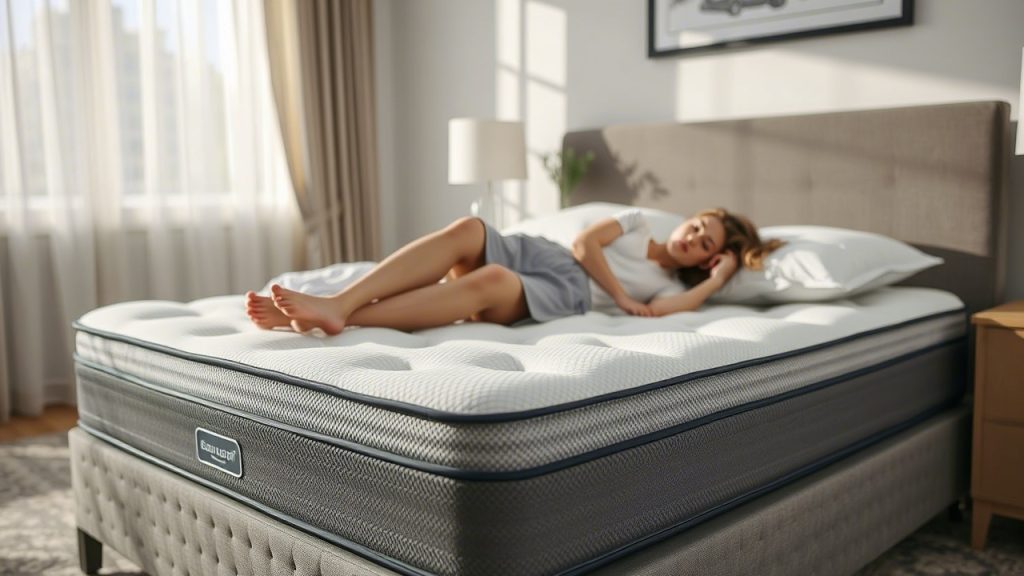Snoring is a common issue that affects millions of people around the world. Whether it’s yourself or a partner, snoring can disrupt sleep, impact health, and cause a strain on relationships. While snoring may seem like a harmless annoyance, it can have deeper implications on your well-being. The good news is that with the right mattress and pillow, you can significantly reduce snoring and improve your sleep quality.
We will explore how the right bedding can play a role in reducing snoring, the types of mattresses and pillows that are most beneficial, and tips for creating an optimal sleeping environment to help minimize snoring.
Understanding Snoring: Why It Happens
Before we delve into solutions, let’s understand why snoring happens. Snoring occurs when the flow of air through the mouth and nose is partially obstructed during sleep. This leads to vibrations of the tissues in the throat and nose, producing the familiar sound. Snoring can be caused by a variety of factors, including:
- Nasal congestion: Blocked nasal airways from allergies or colds.
- Mouth breathing: Breathing through the mouth instead of the nose.
- Excess weight: Fat deposits around the neck can narrow the air passages.
- Sleep position: Sleeping on your back can cause your tongue to fall back and block the throat.
- Age: As you age, the muscles in your throat become weaker, which can cause snoring.
- Alcohol and sedatives: These can relax the muscles in the throat, leading to snoring.
While snoring is common, it doesn’t mean you have to live with it. The right mattress and pillow can make a world of difference when it comes to minimizing or eliminating snoring.
The Role of the Mattress in Snoring
The mattress you sleep on plays a crucial role in your overall sleep quality, including its impact on snoring. A poor mattress can cause your body to be misaligned during sleep, leading to pressure on your airways and encouraging snoring. Here’s how your mattress can affect your snoring:
- Spinal Alignment: A mattress that provides proper support will keep your spine aligned, which can help keep your airways open and reduce the chances of snoring. If your mattress is too soft or too firm, it can cause your body to shift into uncomfortable positions that put pressure on your neck and throat, contributing to snoring.
- Pressure Relief: A mattress that distributes your body weight evenly can prevent uncomfortable pressure points, especially around your neck and shoulders. If you’re constantly shifting in bed to relieve pressure, you may end up in positions that exacerbate snoring.
- Body Positioning: The right mattress can help you maintain a sleep position that reduces snoring. For example, if you tend to snore while sleeping on your back, certain mattresses might encourage you to sleep on your side, which is better for preventing airway obstruction.
Types of Mattresses That Help Reduce Snoring
Choosing the right mattress can help ensure your body stays in an optimal position while you sleep. Here are a few types of mattresses that can contribute to reducing snoring:
- Memory Foam Mattresses: Memory foam mattresses contour to your body’s shape, providing excellent support and pressure relief. These mattresses can help keep your spine aligned, preventing you from tossing and turning during the night. Many people find that memory foam mattresses reduce the frequency of snoring because they allow the sleeper to maintain a natural, relaxed position.
- Latex Mattresses: Latex mattresses are naturally firm and offer solid support. They help align your spine and provide a responsive surface that adjusts to your body’s shape. Latex mattresses also have great durability and are breathable, which can improve your overall sleep experience.
- Adjustable Mattresses: If you tend to snore while lying flat on your back, an adjustable mattress can help. These mattresses allow you to raise the head or foot of the bed, which can help keep your airways open and reduce snoring. Raising your head can prevent your tongue and soft tissues from blocking your throat, allowing for better airflow.
- Hybrid Mattresses: Hybrid mattresses combine the benefits of both memory foam and innerspring systems. They offer a balance of comfort and support, and their ability to distribute body weight evenly can help you maintain the ideal sleep position to reduce snoring.
The Role of the Pillow in Snoring
Just as your mattress plays a significant role in reducing snoring, your pillow can make a big difference too. The right pillow will support your neck and head to maintain proper alignment, reducing the chances of airway obstruction. A poor pillow can cause your head to be tilted in a way that encourages snoring, while the right one can help you sleep more soundly and reduce the noise.
Here’s how your pillow affects your snoring:
- Neck Alignment: A pillow that supports your neck and head in a neutral position can keep your airways open. If your pillow is too high or too low, it can cause your neck to be bent in an uncomfortable way, which may lead to snoring. A good pillow ensures that your head is aligned with your spine.
- Sleep Position: Certain pillow shapes can help encourage side sleeping, which is less likely to cause snoring. For example, a wedge pillow or a body pillow can keep you from rolling onto your back during the night, which can trigger snoring.
- Pressure Relief: Just like your mattress, your pillow should provide pressure relief for your head and neck. A pillow that’s too firm or too soft can cause discomfort and disrupt your sleep, leading to changes in sleep position that may worsen snoring.
Types of Pillows That Help Reduce Snoring
Not all pillows are created equal when it comes to reducing snoring. Here are some options to consider:
- Memory Foam Pillows: Memory foam pillows contour to your neck and head, offering personalized support and alignment. These pillows help distribute weight evenly, keeping your neck in a neutral position and reducing the likelihood of airway blockage.
- Cervical Pillows: Cervical pillows are designed specifically to support the natural curve of your neck. They provide excellent support and help maintain proper alignment, which can prevent snoring by keeping your airways open.
- Wedge Pillows: A wedge pillow elevates your upper body, which can be beneficial for people who snore due to lying flat on their back. The gentle incline helps open up the airways and reduce the vibrations that cause snoring.
- Contoured Pillows: Contoured pillows are shaped to fit the natural curve of your neck and head, providing more specific support than traditional pillows. These pillows are often recommended for people who experience neck pain or snoring.
- Body Pillows: A body pillow can help you sleep on your side, which can reduce snoring caused by sleeping on your back. By hugging the pillow, your body is more likely to remain in a side position throughout the night, leading to less airway obstruction.
Additional Tips for Reducing Snoring
In addition to selecting the right mattress and pillow, there are several other lifestyle changes and tips that can help reduce snoring:
- Sleep on Your Side: Sleeping on your back can cause your tongue and soft tissues to collapse into your throat, leading to snoring. Try sleeping on your side to keep your airways open.
- Maintain a Healthy Weight: Excess weight, especially around the neck, can put pressure on your airways and contribute to snoring. Maintaining a healthy weight can help reduce snoring.
- Limit Alcohol and Sedatives: Alcohol and sedatives relax the muscles in your throat, which can increase the likelihood of snoring. Avoid these substances before bedtime.
- Stay Hydrated: Dry air can irritate the tissues in your throat, causing them to vibrate more. Keeping your body and throat hydrated can help reduce snoring.
- Use Nasal Strips or a Humidifier: If nasal congestion is contributing to your snoring, try using nasal strips to open up your airways. A humidifier can also help keep the air moist and reduce throat irritation.
Frequently Asked Questions
- Can a memory foam mattress help reduce snoring?
Yes, a memory foam mattress can help reduce snoring by providing proper spinal alignment and support, which can keep your airways open during sleep. - What type of pillow is best for reducing snoring?
A cervical or memory foam pillow is ideal for reducing snoring, as it helps maintain proper neck alignment and prevents airway obstruction. - Can sleeping on my back cause snoring?
Yes, sleeping on your back can cause your tongue and soft tissues to block your airway, which leads to snoring. Sleeping on your side can reduce this. - How does a wedge pillow help with snoring?
A wedge pillow elevates your upper body, helping to keep your airways open and reduce the chances of snoring. - Will a firm mattress stop snoring?
A firm mattress can help maintain proper alignment, but it depends on your body type and sleep preferences. A mattress that balances support and comfort is key. - Is snoring a sign of sleep apnea?
Snoring can be a symptom of sleep apnea, a serious condition where breathing stops temporarily during sleep. If snoring is accompanied by choking or gasping, it’s best to consult a doctor. - How can I stop snoring without a pillow?
A pillow is one of the best tools for reducing snoring. However, sleeping on your side and maintaining a healthy weight can also help. - Can weight loss reduce snoring?
Yes, losing excess weight can reduce pressure on your neck and airways, which can help reduce snoring. - Are adjustable beds helpful for snoring?
Yes, adjustable beds that allow you to raise the head of the bed can help keep your airways open and reduce snoring, especially if you snore while lying flat on your back.
Conclusion
Snoring is a frustrating issue that can affect your quality of sleep and overall health. However, with the right mattress and pillow, you can reduce or even eliminate snoring altogether. By selecting a mattress that supports proper spinal alignment and a pillow that keeps your head and neck in a neutral position, you can improve your sleep and reduce snoring. Combined with other lifestyle changes, the right bedding can help you get the restful night’s sleep you deserve.





